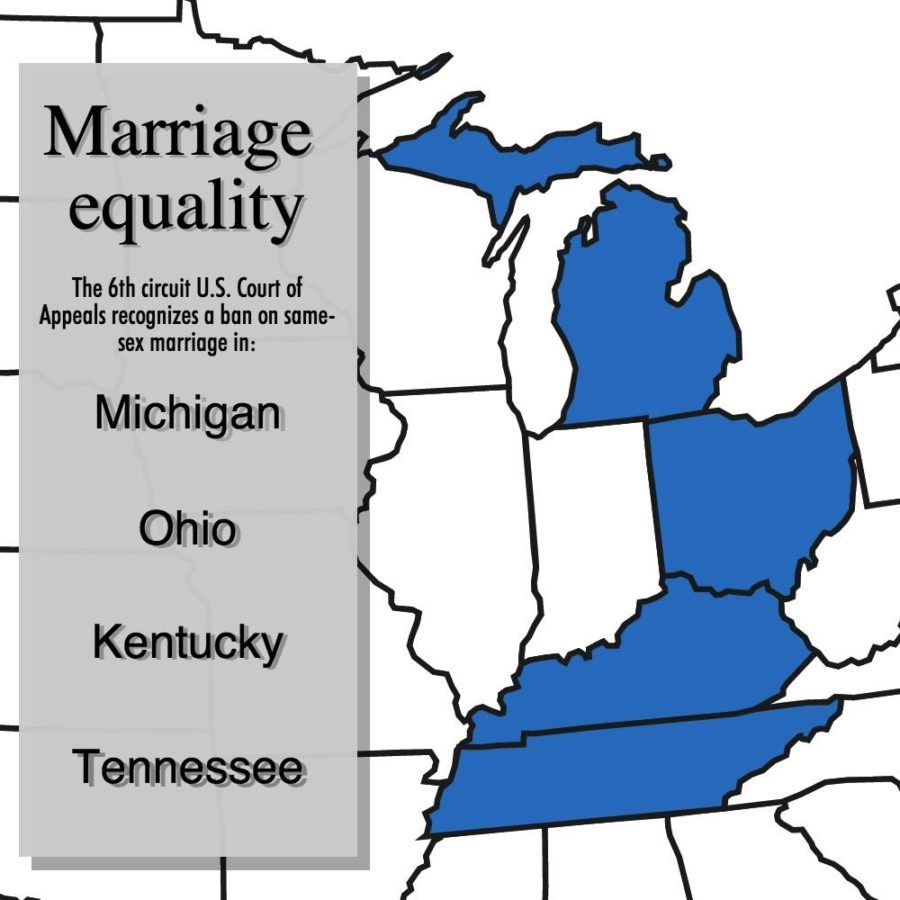Gay marriage likely headed to Supreme court
Richard Martinez/Iowa State Daily
The United States’ 6th circuit Court of Appeals has overturned a ruling that now upheld a same-sex marriage ban in four states.
November 11, 2014
After a string of victories for the lesbian, gay, bisexual and transgender community over the past several months, four states reversed course after a U.S. Court of Appeals ruling upheld same-sex marriage bans in the those states.
The 6th circuit U.S. Court of Appeals issued a 2-1 decision last week, reversing an earlier decision from lower courts and upholding a ban on gay marriage in Kentucky, Michigan, Ohio and Tennessee. The decision makes it the first court to uphold a ban on same-sex marriage since the Supreme Court struck down part of the Defense of Marriage Act last year.
“I wasn’t necessarily surprised that it happened. I was hoping it wouldn’t, but the 6th circuit has mostly been appointed by conservative presidents,” said Adam Guenther, president of the LGBTA Alliance at Iowa State. “It was just a random allotment of the three judges that got put on it. The majority of them are conservatives, generally those nominees aren’t the most open to same-sex marriage or LGBT issues.”
The 42-page ruling was issued Nov. 6, and Judge Jeffrey Sutton argues that courts should not decide the definition of marriage.
“Who decides?” Sutton wrote in the opinion. “Is this a matter that the national Constitution commits to resolution by the federal courts or leaves to the less expedient, but usually reliable, work of the state democratic processes?”
To sum it up, Sutton argues that those advocating in favor of gay marriage should convince citizens in their states to support it instead of relying on court rulings.
“When the courts do not let the people resolve new social issues like this one, they perpetuate the idea that the heroes in these change events are judges and lawyers,” Sutton wrote. “Better in this instance, we think, to allow change through the customary political processes.”
Dirk Deam, professor of political science, says Sutton’s argument is legitimate but is not consistent with past court decisions.
“Rights are not a function of majority rule. Rights are something that are given by virtue of citizenship,” Deam said. “States can’t take away rights by majority vote.”
Last month, the Supreme Court opened its term by declining to hear appeals following lower court rulings allowing gay marriage. The court said it would not insert itself into the debate unless there were differing opinions in lower courts.
“The likelihood [of going to the Supreme Court] is very high because of the conflicts of laws that are developing,” Deam said. “The [Supreme] Court is the last resort and has to resolve those conflicts. If there are problems, they’ll likely take these cases.”
Guenther said he was not certain the Supreme Court would even take the case based on past rulings. If they did, he was not sure they would rule in favor same-sex marriage.
“They were very careful on how they ruled in the [Defense of Marriage Act] case, it just depends on when they take the case,” Guenther said.
Deam said it is hard to make a prediction on how the Supreme Court would rule if they did take up the case, but he laid out what the court would be reviewing.
“The legal concepts that are involved here are the fundamental rights that are associated with marriage and the notion that sexual preference is a protected class,” Deam said. “If either one of those is true, homosexuality is a protected class, or if there is a fundamental right to marriage, then the court has a different standard of review that is tough to beat.”
So far, Deam said, the court has not ruled that way, but a case in front of the Supreme Court would decide those two concepts.
“That’s what the court is going to have to do, one of those two things. It’s going to have to either say marriage is a fundamental right that can be enjoyed by all citizens and can’t be restricted by the government, or they’ll have to say sexual preference is a protected class, and you can’t discriminate against that class.”







